Back to Town, it was hard to know.
California there, we were back here.
East Coast, cold and wet and wonderful and
worrying.
Vaccinated, many of us back and about.
Monday to see Babs and Company at 169 Bar.
Tuesday to Barbes with buddies and pints of
stories about what the city was becoming, legal pot there and here and not
quite in between.
Wednesday to see Will in Princeton
Chatting away for the next few days, chatting
about the family ghosts and menaces, from Sweden and back, his kids growing up
and about and out and into their new lives.
Mom’s breath is troubled in the spring,
But still she comes out to chat and gossip, as
her grandkids play in the backyard.
Kids climbing in the
trees… chatting about Brian, asking his followers not to follow him.
Friday was hard being back, cold and rainy,
editing an old manuscript, catching up on it all.
Saturday Caroline and Karl and Jenny and
Savitri and Billy and Steve and I met.
Karl is talking about Derrida and The Work of Mourning, essays on “friendships in the wake of passing…condolence,
memorial …eulogies, funeral orations—…after the deaths of: Roland Barthes, Paul
de Man, Michel Foucault, Louis Althusser, Edmond Jabès, Louis Marin, Sarah
Kofman, Gilles Deleuze, Emmanuel Levinas, Jean-François Lyotard, Max Loreau,
Jean-Marie Benoist, Joseph Riddel, and Michel Servière, bear[ing] witness to
the singularity of a friendship and to the absolute uniqueness of each
relationship... acutely aware of the questions of tact, taste, and ethical
responsibility.”
Walking about Greenwood cemetery, I am acutely aware
of the friendships that have passed,
Those who can’t or won’t,
The fearful
And the weary, amid the spring of openings and
closings and memorials.
I guess its something everyone was feeling.
A few days later Charles King would post a note:
“Keith D. Cylar would be celebrating his 63rd
birthday today [April 18th]. He died when he was 45. We use to talk
about growing old together, buying a little farm in the mountains of Puerto Rico
or Costa Rica, spending out evenings in our rocking chairs on the porch
watching the night fall.
I still think of Keith every day.
Sometimes with a tear in my eye, and sometimes with a quiet smile.”
I remember that day he left.
And the friends who said goodbye each year.
recalls those days:
“Near the end of April
Twenty Mays have met,
And half a word and half a dream
Remember and forget.”
Leaving the cemetery, Billy
and Savitri and Steve are sitting on their stoop, chatting, looking at the street
corner society opening up in front of them, the teenagers meeting up their street,
not quite able to make sense of it all.
We talk about the
friends who can’t or won’t come join us, the perplexed moment between here and
there, not knowing where any of the movements are going.
But we made inroads in Albany.
Money for education,
Tax the Rich not the poor.
We made inroads.
But the war between us all,
It still looms large.
The sun shines in Billy’s face.
And none of it makes sense.
Be still
Stand still
Stand still….
The future is behind, instead of ahead when you
can’t see it, says Savitri, paraphrasing the Peruvian prophesy, connecting her
life with something else, in a mythology we’re all trying to put our finger
upon.
At night, I find myself with Ken and Earnest.
I was never a big Hemingway fan. Old Man of
the Sea, In Our Time, there was some great stuff. I enjoyed the doc. and
the accounts of the fights.
Anne-christine
d'Adesky posts a note on facebook:
Hemingway doc: the first part irritated
me some— too much hagiography, establishing the legend. The second episode got
more nuanced, chipped away at the mythology, exposed the broken man, the ugly
sides, and his hard work ethic. The third episode has all the heart, as I felt
it, presenting a truer emotional portrait, and letting the fuller complexity of
the man emerge. I felt a pang of compassion for him then, and a bit of sorrow
and openness for Ernest the lover of androgynous women, the man who wanted to
be a girl in bed, the father who cruelly rejected his cross-dressing and, we
are led to presume, gay son. He drank himself to some kind of death, and his
head got hit too many times. He was a racist — his words are ugly — and a
sexist and controlling and abuser and so many negatives. And he loved life and
sought to show what mattered — to him— even though it comes across as
portentous now…I do like that they focused on the writing, the creating and
doing and meaning of it for him and his readers.
On he went,.writing
and thinking, recognizing the fallacy it all:
“Never think that war, no matter how necessary, nor
how justified, is not a crime.”
He tried not to worry about things:
“Worry a little bit every day and in a lifetime you
will lose a couple of years. If something is wrong, fix it if you can. But
train yourself not to worry: Worry never fixes anything.”
The books are peppered with settled scores, stories
of the friends he fought.
All week, I wonder what really happened between
Hemingway and John Dos Passos?
The friendship fight between Dos Possos and Hemingway
during the Spanish Civil War was one for the ages.
their conflict, our conflict.
Its 1937, the two writers are
going to meet in Spain.
Dos Passos is worried about a
friend who disappeared in the conflict, perhaps at the hands of the communists.
Ever a loyalist, Hemingway has little time for his friend’s sentimental concerns that might divide loyalty; Dos Passos, a humanist, is unset with his friend’s untimely demise.
Dan Piepenbring writes in The Paris Review:
“Hemingway
broke the news to his friend, but apparently he was impolitic about it—and so
began their falling out, with Dos Passos vouching for Robles and Hemingway
laughing at his naïveté.
Dos
Passos’s response to his friend’s disappearance reflected his sense that
progressive politics without human decency is a sham. Hemingway, in a thinly
disguised magazine article about the episode published in a short-lived Esquire
spinoff called Ken, described these scruples as “the good hearted naiveté of a
typical American liberal attitude.”
José
Robles was a left-wing aristocrat … [but] maintained enough independence of
mind to raise an alarm among pro-Communist Spanish authorities and the Soviet
intelligence agents who, by early 1937, were bringing the government increasingly
under Stalin’s control. Dos Passos was
counting on Robles to serve as his main Spanish contact on the film; but by the
time the two American novelists reached Madrid, separately, Robles had
disappeared. It was Hemingway who learned first … that Robles had been arrested
and shot as a Fascist spy. To this day, the manner and motive of Robles’s death
remain a mystery …”
Why do men fight like this?
The sadism, the moral questions are
many in their rift.
I spend the week wondering, seeing myself and my friends in this question of expedience and humanist
mourning.
Looking at the city,
Looking for a friend.
“Wake up the worlds on fire,
Have a nice day,”
I read to the teenager, from poetry as
insurgent art, by Lawrence Ferlinghetti.
By Sunday, the little one stays inside all day,
anxious about her art project.
She has to document 100 of anything.
First a hairball, then a combustion explosion.
We walk outside in the drizzle, exploring the Gowanus,
lost objects… industrial world in flux, found objects and treasures….
Maybe you could count pcb’s in the polluted water,
I say as we get closer to the canal.
The “EPA's
investigation
confirmed the widespread presence of more than a dozen contaminants, including polychlorinated
biphenyls (PCBs)...” and other toxins in the Gowanus Canal.
Still,
the city wants to hyper develop the area.
Only
a temporary restraining order is holding off the bulldozers.
The
decades long cleanup continues.
On
we walk through the alley,
Past a cat sanctuary someone has made.
Some new graffiti,
Looking into the water, at the oil and
pollutants, thinking about dead bodies.
Bodies lost the water.
Bodies on the street.
Make an art project of a found object, I suggest.
The little one starts collecting a hundred
sticks,
Inserting them into the fences.
Works of nature in an industrial zone.
Look at the ecology of a park, of water, of area
destined to be zoned away, paved into a parking lot.
I stroll past the Gowanus Sharing Corner, where
mutual aid projects are sprouting.
Grab a few things at C Town and make my way back.
By then the little one has put up some 36
sticks, only 64 to go.
Dad can you help me look?
Sure, I reply.
Art finding its way into a temporary exhibition.
On she worked away, posting one piece of wood
after another.
I stood, watching her installation grown,
Looking at the city.
Thinking about the city and its delicate ecosystems.
“We Don’t Need More Life-Crushing Steel and Concrete” writes Paul Greenberg and Carl Safina. “Thelong-term needs of ecosystems should come before our knee-jerk expectations….we need to focus on updating what we’ve already damaged.”
In the meantime, candidates are making cash on the developer goldrush.
And
the city is acting as if the TRO is crumbling, ready to move forward despite:
“Widespread Contamination, Health and Ecological Problems; Hundreds of Samples find PAHs, PCBs, Heavy Metals and Other Toxins.”
Says
Voice of Gowanus:
"We are outraged that
the city has shamefully opted to divulge details of confidential settlement
discussions in an aggressive public relations move to try to misconstrue the
status of our lawsuit and the Gowanus rezoning ULURP application. The city's
press blitz at this juncture is misleading, unprofessional, and a deep breach
of trust once again by our own public officials. Unfortunately, the
city's clear pattern of disregard for the law, for due process, and for access
to the democratic process for all in our community - in its push to ram
the Gowanus rezoning through during a pandemic and at the end of the
Mayor’s term in office - is all too common. All we can say is the temporary
restraining order imposed by the Court remains in place. Any
characterizations to the contrary are disgraceful and underhanded."
Neighborhood after
neighborhood face an onslaught of developer dollars, to pollute, bulldoze, upside,
blandify and sanitize.
Saturday, I met my friends outside of BlackRock on 51st Street.
All
Eyes on Black Rock, say activists there.
“JP Morgan Chase and BlackRock are the
biggest funders of climate destruction. This is exemplified by their financial
ties to the Line 3 pipeline, which would carry nearly one million barrels of
dirty tar sand oil daily.
We will rally at BlackRock HQ in
Manhattan at 12:30pm then march to JP Morgan Chase HQ (47th Street between
Madison and Park) RSVP at http://bit.ly/BankruptLine3Rally
At BlackRock, the $9 Trillion Wall
Street behemoth, we will say “All Eyes On BlackRock”. Blackrock, the world’s
top investor in fossil fuels, must divest, starting with Line 3 and dirty tar
sands.
Corporate shareholder meeting season
begins soon, so we will be demanding BlackRock vote its massive shareholdings
to force climate action by the corporations it owns.
JP Morgan is the world’s top bank financier of fossil fuels. It also finances forest destruction. It has pumped $317 billion into oil and gas since the Paris climate agreement! JPM is a key financier of the Line 3 pipeline, which like Dakota Access and KeystoneXL, is a massive polluting project that violates indigenous peoples’ rights.
Join us and get ready to get LOUD.”
All week, I’m thinking about the wins we
achieve when we show up, even if fighting seems insane. The joy we feel together screaming it out.
Via Maria Bautista, who I got arrested with seven years ago fighting for education dollars, posted:
“Y'all WE WON!!! It's taken me a
couple of days to process, and I still don't believe it, but we won! After 30
years of fighting for equity in school financing, we won a full phase-in of
billions of dollars owed to public schools across NYS. THIS IS HUGE! I can only
imagine what's more possible because of these additional resources.
This work has been really difficult
and emotional, and it was possible because of the deep power of organizing.
Year after year, parents, students, teachers showed up and demanded NYS not
forget its constitutional obligation to our children, to Black, brown and poor
students across NYS. It's this radical love for our children and our
communities that made this win possible.
So much love to all the folks that
joined us this struggle. I'm infinitely grateful to Robert Jackson for
launching this campaign in 1993 and for always walking the talk. To the folks
that knew we needed to build long term people power in order to win and created
the Alliance for Quality Education to create this container for change. Billy
Easton Karen Scharff John Kest Rosemary Rivera Incredibly honored to work with
a team of deeply committed womxn that fought to make this a reality: Jasmine
Gripper Zakiyah Ansari Marina Marcou-O'Malley Julia Watson A Sa Mia Karina
Roman Stevie Vargas Smitha Varghese
This win is a collective win. Sorry
if I didn't tag everyone, it's just too many folks. Thank you for making those
calls, joining the rallies, press conferences, for coming to Albany, for
holding folks accountable at every level. Looking forward to continue to build
a school system that honors all our children.
Join us April 23rd 5-7pm to
celebrate. Bring all that radical joy. This one is one for the books ![]() .
.
On
Sunday, I dropped off my compost at Carroll Park and went to join what felt
like all of my friends in Tompkins Square Park to beat back the onslaught:
MARCH TO SAVE EAST RIVER PARK
Sunday, April 18, 2021, 12:00PM
Gather at Tompkins Square Park
(semicircle with the big elm tree near the southeast entrance)
March to East River Park
Hear
Our Passionate Advocates
Kiara Williams, Warriors in the Garden
Emily Johnson, dancer, choreographer, Lower East side
Eileen Myles, poet, East Village
Alicia Boyd, Movement to Protect People, MTOPP, Brooklyn
Rev. Billy and the Church of Stop Shopping Choir
DJ Ralphy CBS
AND MORE!
children,
adults, dogs all welcome
Please wear your masks and maintain social distance
(desplácese
hacia abajo para español)
We
are inviting you to join us in this urgent exercise of free speech and outlet
for the immense frustration we feel at the betrayal by public servants i.e.,
our mayor, our City Council Member and the entire City Council, our Community
Boards, City Planning Commission, the Parks Department and all who are engaged
in supporting the farcical, greedy and short-sighted version of flood control
known as East Side Coastal Resiliency.
We
worked with city agencies since 2012 to come up with a strong green approach to
coastal resiliency in the wake of Hurricane Sandy. We supported the original
East Side Coastal Resiliency plan with its rolling berms. It did not require
the destruction of an 82-year-old park with 1,000 trees, ballfields, a running
track, an esplanade along the riverfront, picnic and barbecue areas and a
paradise of growing things and birds and fishing areas.
The
park is a multi-racial multi class multi age dream. It is a living symbol of
the New York we love and treasure. It faces public housing and is the only
available green space for largely low income BIPOC people who require this
access to air and exercise for quality of life.
Instead,
what our mayor’s office has foisted on us and we have been protesting for three
years is total destruction of this park. It’s a plan that would add eight feet
of fill, a million tons. And while the fill is being added and until it
settles, it will blow in the faces of the residents across from the park. The
city also wants to build a cement factory on the river’s edge.
The
glamorous and synthetic plan the city promises will in essence be a concrete
wall along the river with a levee covering all the parkland. It will be covered
in artificial turf, concrete and saplings that will not provide shade for many
years. There will be expanded tennis courts and parking lots for maintenance
vehicles in what are now some of the prettiest sections of the park—just what
our neighborhood doesn’t need. There will be walkways high above the river.
If
the city says it will take five years, it will take ten. There will be NO flood
control in that time. If a storm occurs, then it will be a muddy mess. It will
turn our neighborhood into a bathtub full of contaminated flood water.
For
starters we demanded adequate environmental review, because our concerns were
dismissed in the public review process. Our group demanded the rationale for
this plan, and we were told there was a value engineering report. It was not
forthcoming. Its existence was denied and most recently a redacted form was
offered. Now there’s a less redacted form. The city is making us fight to see
how the park destruction plan came about.
We
march today because we are demanding a moratorium on park destruction.
Thousands of people have signed petitions since 2018. This march is a human
petition.
We
demand a stop to the East Side Coastal Resiliency plan now. We demand a real
environmental review. We demand interim flood protection. We demand a better
plan that does not now in a pandemic still–or ever–take away the only green
space in a low-income neighborhood to replace it with a project twice as
expensive that smells only of development.
Our
mayor and the real estate cabal his government has become look forward to a
park that will reprise what happened on the west side and will encourage
gentrification and displacement while ending the best parts of the childhoods
of the kids who live here and people of all ages including seniors living
nearby who are being deprived of the joys of their publicly lived and cherished
New York City life. It is all our city. We are marching for ours.
For
too long our government has been happy to tell a tale of two cities, one is to
sell and silence the other is to invite and lure. The tall shiny buildings all over
Manhattan are empty, this park is full, the evidence against this plan is life
itself.
And
we march as life itself today to demand that we prevail and stop the plan to
destroy the park and instead insure our natural and collective futures.
See
you in the park,
Eileen
Myles, Emily Johnson and Harriet Hirshorn for East River Park ACTION.”
Finishing,
I rode through Chinatown to catch up with the activist informed reading gang.
“God
is change,” says Adrienne, in Well Read Black Girl, our book for the
week.
What
are you reading, we ask each other.
When did you first see yourself in book or story?
It’s
a question we are all asking over and
over again.
We
all get to dream.
Its
great to see everyone to talk about those dreams.
Frank’s
memories of playing stickball in the park,
Billy’s
sermons,
Savitri’s
organizing,
Babs
on her Bike,
Virginia’s
insane pants,
Bill’s
punk shows.
JC’s
poetry.
On
and on and on and on and on.
Its
great to dream with everyone together.



















































































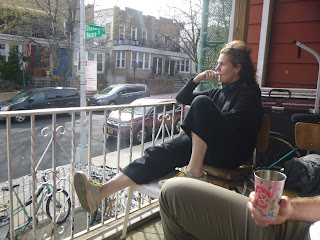




































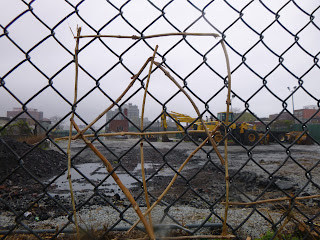




























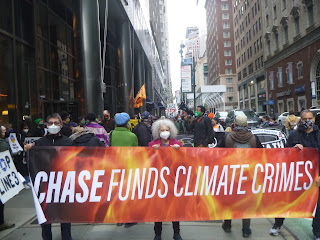



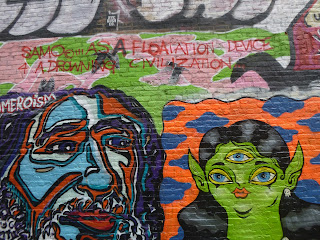










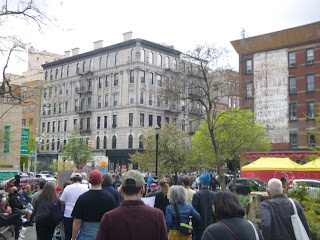









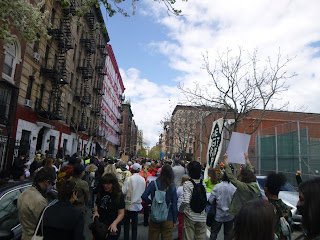






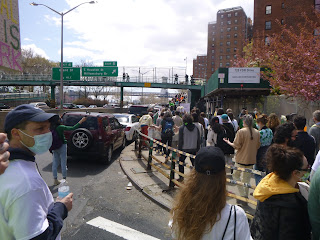






































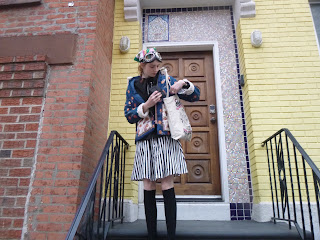


No comments:
Post a Comment